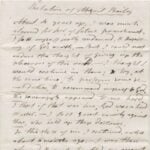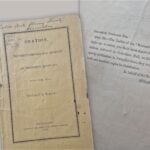The Congregational Library & Archives is proud to announce the completion of a major three-year New England’s Hidden Histories (NEHH) project grant.
In 2021, the CLA was awarded a grant from the National Endowment for the Humanities (NEH) to identify, digitize, transcribe, and make available early Congregational church records and papers as part of the New England’s Hidden Histories project. With this support, the project has added over 60 collections, comprising more than 25,000 digital images and 8,000 pages of transcription, to its digital archive between 2021 and 2024.
“Support from the NEH has been essential in expanding New England’s Hidden Histories into the pre-eminent digital collection of primary source material from the region,” shared CLA Executive Director Kyle Roberts. “Church history is community history in early America. The digital archive contains riches to be uncovered by the student, the scholar, the genealogist, and the lover of history.”
In completing this grant, NEHH worked with partners at the American Antiquarian Society, Cape Ann Museum, Connecticut State Library, Massachusetts Historical Society, and the New Hampshire Historical Society to digitize their Congregational church collections. NEHH also partnered with individual churches to digitize their records, including the First Parish Church in Dover, NH; the First Church of Christ in Pittsfield, MA; and the First Congregational Church of Yarmouth, MA.
New records from New Hampshire and Connecticut represent a significant expansion for the NEHH project. A majority of the previously digitized records were from Massachusetts churches, but work on this grant has expanded NEHH collections of Connecticut records from six to 25, while New Hampshire collections have increased from two to 22 churches.
“This collaboration means that genealogists and other researchers have access to an amazing number of records that wouldn’t otherwise be freely available to them,” said Lizette Pelletier, State Archivist at the Connecticut State Library.
In addition to digitizing these collections, many records have also been transcribed by the NEHH transcription team. Transcription makes these records much more accessible, as transcriptions are both easier to read and keyword searchable.
Trenton Carls, Head Librarian and Archivist at the Cape Ann Museum, noted that transcription by NEHH volunteers will “continue to increase access to and discoverability of” collections such as the records from the First Church of Gloucester, Massachusetts, whose digitization he facilitated as part of this project.
“The New England’s Hidden Histories project has been able to add records from over 50 new communities through the generous support of the grant from NEH, said Dr. Tricia Peone, Project Director for New England’s Hidden Histories. “This has significantly expanded the project’s digital resources for community histories in New Hampshire and Connecticut. I’m excited to see what stories will be uncovered in these remarkable collections.”
These newly available records include valuable data for genealogists, with vital records now digitized for 41 towns in New Hampshire and Connecticut. They also contain fascinating stories from early American history with local and national significance, such as how churches experienced the American Revolution.
Many more exciting stories are waiting to be uncovered in the New England’s Hidden Histories’ digital archive, which is available to access for free at congregationallibrary.org/nehh.
About the New England’s Hidden Histories Project
The New England’s Hidden Histories project began in 2005 and has since amassed a digital archive with 132,000 digital images and 24,000 pages of transcription. These collections include records from more than 150 communities, including congregations in Massachusetts, Connecticut, New Hampshire, Maine, and Vermont. The project comprises an online collection of manuscript Congregational church records from approximately 1620 to 1850, which includes letters, sermons, diaries, conversion narratives (relations of faith), church disciplinary cases, and account books, as well as lists of baptisms, members, marriages, and deaths. These valuable, but often overlooked, documents provide firsthand accounts of a broad range of community events, from ecclesiastical councils and town meetings, to witch trials and revolutionary debates.
About the Congregational Library & Archives
The Congregational Library & Archives is an independent research library. Established in 1853, the CLA’s mission is to foster a deeper understanding of the spiritual, intellectual, cultural, and civic dimensions of the Congregational story and its ongoing relevance in the twenty-first century. The library’s collection holds some 225,000 books, pamphlets, periodicals, and manuscripts, as well as a digital archive, which contains more than 130,000 images, many drawn from the New England’s Hidden Histories project. Throughout the year, the Congregational Library & Archives is a thriving research center and offers educational programs and fellowships for students, scholars, churches, and anyone interested in Congregationalism’s influence on the American story.






